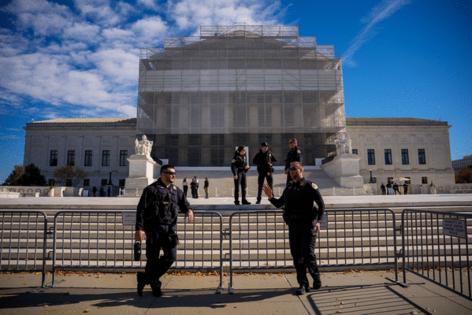Supreme Court extends pause on SNAP food aid as families wait
Published in Variety Menu
WASHINGTON — The U.S. Supreme Court extended a pause on $4 billion in food aid, likely ensuring that millions of low-income families won’t get assistance until Congress reopens the government and provides full benefits.
Siding with President Donald Trump’s administration, the justices said they will maintain a block on lower court rulings that would require immediate payment of full Supplemental Nutrition Assistance Program benefits this month for 42 million recipients. Justice Ketanji Brown Jackson dissented.
The administration told the Supreme Court on Monday that allowing full SNAP benefits immediately would risk upending the deal Republicans struck with eight Senate Democrats to let the government reopen. The court should “let the political process that is rapidly playing out reach its conclusion,” the administration argued.
The groups suing to restore full benefits said that argument showed the administration was using hunger for political ends.
The administration’s position “confirms what has been clear all along — that the government is leveraging SNAP to gain partisan political advantage in the shutdown fight,” groups led by the Rhode Island Council of Churches argued. “This court should not participate in that effort.”
The Senate passed the budget deal Monday night and the House is planning to vote on Wednesday, when it returns from a weeks-long absence. With Trump expected to sign the legislation, the government could reopen on Thursday. The government shutdown has been the longest ever at 42 days so far.
A Justice Department lawyer said in a different court case on Monday that it would take 24 hours for the US Department of Agriculture, which administers SNAP, to make the full November benefits available.
The department and other U.S. agencies say the government right now doesn’t have enough money to fully fund SNAP benefits for November. The administration contended that courts are powerless to review its management of the shutdown, including its decision to reduce food aid.
U.S. District Judge John McConnell in Rhode Island said last week that the administration’s offer of partial payments was inadequate because the complexities of that approach would delay distribution of the money. “The evidence shows that people will go hungry,” McConnell said.
Justice Jackson put McConnell’s rulings on temporary hold Friday night. Her order would have expired just before midnight Tuesday night had the Supreme Court not intervened again.
The new order, which the Supreme Court called an “administrative stay,” will last until Thursday night, by which time the government is expected to be open.
At issue was whether the Department of Agriculture needed to use available reserves, including money from child nutrition programs, to avoid a SNAP shortfall. The government said tapping those programs would put them at risk, an assertion McConnell called “implausible.”
The Supreme Court case is Rollins v. Rhode Island State Council of Churches, 25a539.
©2025 Bloomberg L.P. Visit bloomberg.com. Distributed by Tribune Content Agency, LLC.










Comments